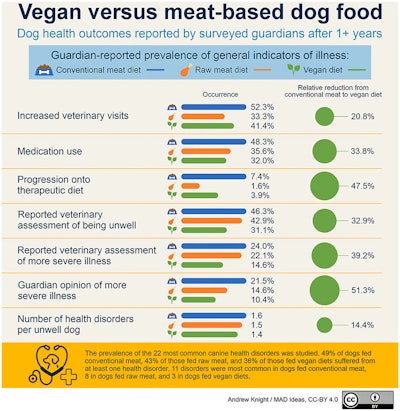A study lead by Professor Andrew Knight at the University of Winchester in the UK found fewer cases of health disorders overall in dogs fed vegan diets.
New research from the University of Winchester led by veterinary Professor Andrew Knight found that dogs fed vegan diets may experience better health outcomes compared to those on meat-based diets. The study surveyed 2,536 dog guardians who provided data on their dogs’ health over at least one year. Among the dogs studied, 54% were fed conventional meat diets, 33% raw meat diets and 13% vegan diets.
Researchers assessed the health of the dogs using seven general indicators, including frequency of veterinary visits, medication use, progression to a therapeutic diet, and veterinary assessments of illness severity. They also examined the prevalence of 22 specific health disorders based on veterinary evaluations. The results showed that dogs on vegan diets had the lowest prevalence of health disorders (36%), compared to those on raw meat (43%) and conventional meat diets (49%).
The probability of suffering from specific health disorders was highest in dogs on conventional meat diets for 11 disorders, on raw meat diets for eight disorders, and on vegan diets for just three disorders. Regression analyses were conducted to control for factors like age, sex, neutering status, breed size and exercise levels.
Overall, the study found that dogs fed vegan diets showed the best health outcomes, with substantial and statistically significant reductions in the risk of various health issues. The reductions in risk ranged from 14.4% to 51.3% for the seven general health indicators when compared to dogs on conventional meat-based diets. For six specific disorders, dogs on vegan diets had a 50% to 61% lower risk compared to those on conventional meat diets.
According to the researchers, when combined with findings from other related studies, the results consistently associate vegan diets with lower risks of multiple specific health disorders in dogs. Notably, no health disorder was found to be consistently more prevalent in dogs on vegan diets.
Read the full study here.

